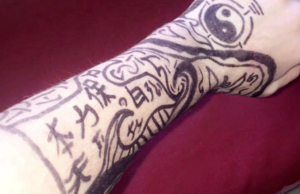My body, my choice
“NO FACIAL OR OTHERWISE VISIBLE PIERCINGS WILL BE TOLERATED,” blares the underlined passage in a list of rules and regulations. I’m told I will have to wear a large, beige bandage over the stud on my upper lip, and my nose hoop has to disappear completely. This doesn’t make me especially upset, I am simply happy I got a job. But what about people who are prejudiced so fiercely for their body modifications that they cannot find a job at all? Is this fair?
The reasoning I often hear justifying prejudice against people with body modifications is something to the effect of “It’s their fault, they shouldn’t have gotten so many piercings/tattoos.” This confuses me. Though I understand that piercings and tattoos used to be a sign of deviance, now they are widespread. Everyone from soccer moms to college students can sport a tattoo, so why do the negative connotations still exist? I will tell you the reason; employers add fuel to the fire by prejudicing against people with body art, whether it is openly written in workplace rules like the ones I described above or festering beneath the surface.
Stereotyping and prejudice against things like weight, gender, race, and other factors are strongly discouraged in the workplace. Though it still happens, an employer found applying prejudice to hiring procedures can be sued. Body art is part of personal appearance and should be respected, but it is openly rejected and shunned from a professional environment. Yes, god forbid we do what we want to our own bodies. Don’t expect to get a job with a mindset like that!
In a college town like ours, the buzz of a tattoo gun can nearly always be heard pouring from one of the many body art parlors scattered about. College students are freed from underneath their parents wing and want to take the next step in separating themselves from their parents. Body art can often be a part of that. Does independency denote deviance in these individuals? Of course not! Finding oneself in one’s own outer appearance is a common key to finding one’s inner self. There’s no basis for these claims of “irresponsibility” in people with body art, especially when we’re surrounded by hard working students who are flexing their freedoms. The image of the tatted loser outcast without a job or a future should be so far behind us, especially with statistics that indicate a rise in the presence of body art on people of all ages and demeanors.
About a year ago, I worked in a small restaurant as a waitress. There was a rule against visible piercings there, as well, but I only had a nose ring at the time. I would put in back in after work and no one would be the wiser. But a co-worker of mine was not as lucky; she was forced to remove lip piercings and the holes from these piercings were obvious to anyone. She was a friendly individual, she was dedicated to her job, she never complained, and no one ever complained about her. One day, however, a man was sitting at the bar, ordering hash browns and a coffee. As my pierced co-worker took his order, I rolled silverware a few chairs down and kept an eye on my tables. This man was terse and sarcastic toward her, for what I assumed were reasons of his own, but my co-worker maintained a friendly smile and an even keel, handed him a piping hot cup of coffee, and put his order in right away. As he unfurled the newspaper, he glanced over at me through large glasses, peering from underneath a tattered baseball cap. “She would probably get more tips if she had less holes in her head,” he scoffed and sneered. Though his order was to him quickly and his coffee cup never emptied, he still left without tipping his waitress. His behavior is an excellent example of this unfair prejudice.
The evolving workplace should be a place of open-mindedness. Though I know that employers could not control the attitudes of patrons like the one I described above, hiring people with body art will increase a sense of normalcy toward these modifications in the workplace. Making people with piercings and tattoos a rare occurrence in the workplace only affirms patron pre-conceived notions of deviance affiliated with body art. I encourage business owners to end this senseless, illogical, unquestionable law and move forward with acceptance in their establishments.









You must be logged in to post a comment Login